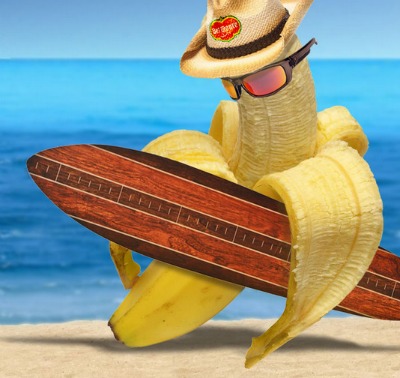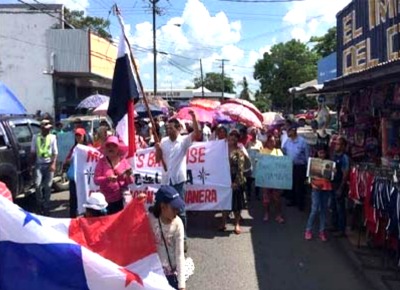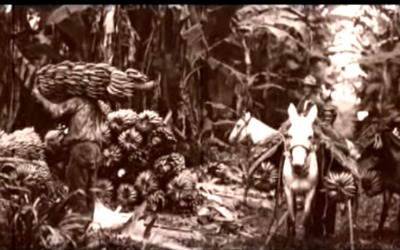April 26, 2017

This is excellent news for the economy of Puerto Armuelles and its district of Baru.
It will also be good for many folks in Bocas del Toro.
Which is why all the Chiricanos and Bocatoreños deputies in the Legislature voted yes on it.
Our very own Porteño, deputy Carlos Motta (see photo) of the Democratic Revolutionary Party (PRD), was a major proponent for this bill. I hear he is very happy that jobs and more bananas are coming to Baru.
(Note: Baru is a district in the Chiriqui Province. Puerto Armuelles is the principal town in Baru)

More Jobs
Jobs are why locals were so eager for Del Monte to get the final go ahead by the National Assembly.
More Bananas
The agreement requires that Del Monte put 900 hectares into banana production each year. (Note: the banana fincas are mostly located in the hills above Puerto Armuelles.)
On average, a hectare of land produces 2,725 boxes of bananas a year.
This means alot more bananas. Maybe we will finally be able to find bananas for sale in Puerto Armuelles on a regular basis.
The Details
The Contract between the State and Banapiña details a "Banana Reactivation Project".
It includes:
The contract is for 20 years, and automatically extendable for another 20. However, its tax exemptions must be reviewed by the state after the initial 20 year term.
The 5804 hectares that Del Monte will lease include 4030 State-owned hectares and 1,774 hectares owned by individual owners (including Coosemupar) who will lease them to the State. The State in turn will sublease those 1774 hectares to Del Monte (aka Banapiña). There may be an option for Del Monte to buy those 1774 hectares in the future.
The land must be leased since 90% of the banana plantations are less than 10 kilometers from the border. Foreigners (like Del Monte) are forbidden by the Panamanian constitution to own titled land within 10 kilometers of the border.
Until very recently, there have been continual delays in Del Monte getting permission to grow bananas in Baru.
The Government has made promises & then broken them.
Some progress was made.
But then it was stuck.
The "by early 2017" promised deadline had come and gone.

In March & April 2017, Portaneos took to the streets over the delay.
They organized marches and other peaceful protests to put pressure on the government. They wanted the deal approved by the legislature so that Banapiña Panama, a subsidiary of Del Monte, could finally produce bananas in Puerto Armuelles and other parts of Baru.
The protests seems to have worked.
FYI - they voted yes on Bill 488, the contract between the State & Banapiña Panama to reactivate banana production in Baru
It is now fully approved!
Del Monte (Banapiña) can now start to grow and harvest bananas in Puerto's banana plantations and in other areas of Baru.
The negotiations have involved many factors and obstacles.

Puerto Armuelles was once synonymous with bananas. Starting in 1928, Puerto was built as company town. And it’s company was Chiquita Banana. Unfortunately, racism by the company and worker unrest lead to its workers striking and sabotaging Chiquita Banana’s crops.
Finally, in 2003, Chiquita sold its now unprofitable Puerto Armuelles banana business to a local cooperative, called Coosemupar. Due to a number of factors, Coosemupar was not successful, although it still limps along in a very limited fashion.
Chiquita's departure had a dramatic impact on Puerto Armuelles' prosperity and population. The town went from having close to 50,000 people to alittle more than 20,000 in 2010. The government has not done a census since 2010. But anecdotally, Puerto's population is more than 25,000 these days. Because even without a banana company, Puerto Armuelles's economy has been steadily improving over the last 5 years.
Adding Del Monte to Puerto Armuelles' economy will be a tremendous boost to its prosperity. Both Puerto and Del Monte have been counting on this. Del Monte has been in Puerto for awhile now getting things into place so they would be able to start work once they got the okay from the National Assembly.
It will be exciting to see what happens once the green gold of bananas is seen in the streets of Puerto Armuelles once again.
You can learn more about Puerto Armuelles by starting here.
Interested in living in our charming beach town? Check out our Puerto Armuelles real estate.
To learn more about the backstory of Del Monte coming to town on my site, read about the Minister of the Presidency, Alvaro Aleman, visit to Puerto Armuelles in July 2016. President Varela also touched on the status of Del Monte on his visit to Puerto in September 2016.